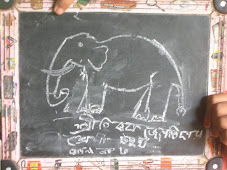 Sachin arrived to collect me from my hotel at 10am as planned. Again we took his bike out into the villages 40km from Aurangabad. In the first village, Sonkheda, I was warmly greeted by the 200 children at the school with flowers, berries, a coconut and the most gorgeous smiles. In this school 190 of the children are going through Pratham ‘Read to Learn’ programme and 10 take the ‘Learn to Read’ programme. There is a test to divide children up between the two classes, the former being for the more advanced pupils and where Pratham hopes that all children will advance to. Each level of the programme lasts for 3 months at a time and the children are tested once a month to monitor their progress. In Sonkheda I met Sriram Wakale, the village elder, who in extremely impressive English told me how these children are the building blocs of India and Pratham is the cement between these blocs. In the second village, Sarai, I spoke with the headteacher who had concerns about the attendance of children to school, particularly in migrant families (see Pia’s blog). She assured me however that attendance ratings are improving following a government campaign to ensure all children between 5 – 10 years old are going to school daily.
Sachin arrived to collect me from my hotel at 10am as planned. Again we took his bike out into the villages 40km from Aurangabad. In the first village, Sonkheda, I was warmly greeted by the 200 children at the school with flowers, berries, a coconut and the most gorgeous smiles. In this school 190 of the children are going through Pratham ‘Read to Learn’ programme and 10 take the ‘Learn to Read’ programme. There is a test to divide children up between the two classes, the former being for the more advanced pupils and where Pratham hopes that all children will advance to. Each level of the programme lasts for 3 months at a time and the children are tested once a month to monitor their progress. In Sonkheda I met Sriram Wakale, the village elder, who in extremely impressive English told me how these children are the building blocs of India and Pratham is the cement between these blocs. In the second village, Sarai, I spoke with the headteacher who had concerns about the attendance of children to school, particularly in migrant families (see Pia’s blog). She assured me however that attendance ratings are improving following a government campaign to ensure all children between 5 – 10 years old are going to school daily.Waving ‘Namaste’ to the adorable smiles, we went on to see the second of the ten day teacher training days at a nearby centre. There I was welcomed with the honest enquiry from one gentleman, ‘are you instructing us Madame’? To mine, and Sachin’s, astonishment, the head of the training college decided my visit would be a fantastic opportunity for me to, not just participate, but to instruct the English, and to my horror, the science classes!  In the first three English classes we discussed differences in educational systems, politics, culture, food, clothing, and India as a growing power. In the science class I managed to hand over my responsibility to Pratham’s volunteer Dr Gabhir, who led the class on separation of liquids. In each class I received a glorious welcome ceremony and word of thanks, as if the queen was visiting. Later, over chai, I was told by Sachin that ‘the guest is God’ in India. How lucky I am to be a guest here!
In the first three English classes we discussed differences in educational systems, politics, culture, food, clothing, and India as a growing power. In the science class I managed to hand over my responsibility to Pratham’s volunteer Dr Gabhir, who led the class on separation of liquids. In each class I received a glorious welcome ceremony and word of thanks, as if the queen was visiting. Later, over chai, I was told by Sachin that ‘the guest is God’ in India. How lucky I am to be a guest here!
 In the first three English classes we discussed differences in educational systems, politics, culture, food, clothing, and India as a growing power. In the science class I managed to hand over my responsibility to Pratham’s volunteer Dr Gabhir, who led the class on separation of liquids. In each class I received a glorious welcome ceremony and word of thanks, as if the queen was visiting. Later, over chai, I was told by Sachin that ‘the guest is God’ in India. How lucky I am to be a guest here!
In the first three English classes we discussed differences in educational systems, politics, culture, food, clothing, and India as a growing power. In the science class I managed to hand over my responsibility to Pratham’s volunteer Dr Gabhir, who led the class on separation of liquids. In each class I received a glorious welcome ceremony and word of thanks, as if the queen was visiting. Later, over chai, I was told by Sachin that ‘the guest is God’ in India. How lucky I am to be a guest here!______________________________________________________
www.readindia.org
www.pratham.org.uk
www.prathamusa.org
www.pratham.org
www.readindia.org
www.pratham.org.uk
www.prathamusa.org
www.pratham.org

No comments:
Post a Comment